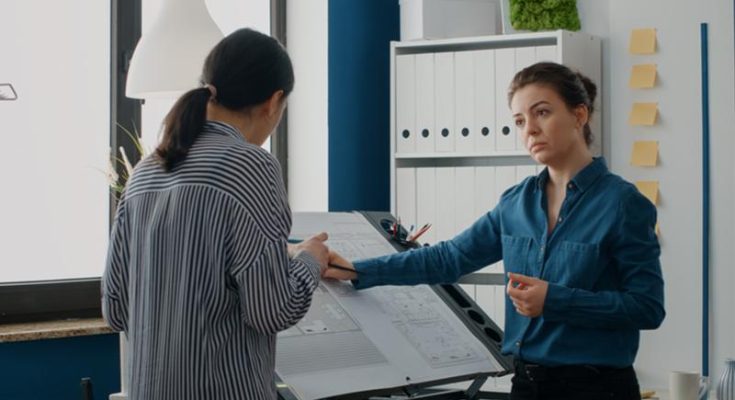Corporate identity reflects how a company presents itself, and interior design plays a direct role in reinforcing it. Every design choice, from the floor plan to the furniture style, communicates values and priorities. A sleek, minimal setup suggests efficiency, while an open, collaborative environment signals creativity and teamwork. Employees and clients walking through an office experience an unspoken message about the company’s character.
Investing in corporate interior design solutions allows businesses to align visual and functional elements with their branding. Wall colours, lighting, and décor contribute to projecting a unified identity. Meeting rooms with advanced digital setups communicate modernity and innovation, while common spaces built for social interaction show that employee well-being receives attention. These elements work together to form a physical reflection of corporate values.
Partnering with an office renovation contractor ensures design execution matches the vision. Contractors handle technical aspects like layout optimisation, materials, and compliance with safety standards. Their involvement ensures identity-driven plans transition smoothly from concept to reality.
Shaping Workplace Culture Through Design
Culture in a workplace develops not only through policies but also through the environment. Interior design affects daily interactions, productivity levels, and employee satisfaction. Open layouts encourage collaboration by making communication effortless. Private pods or quiet zones, on the other hand, allow staff to focus without distraction. Creating balance between these zones supports diverse workstyles.
Lighting, ventilation, and ergonomic furniture also influence how people feel and perform. Natural light creates uplifting environments, while poor lighting diminishes focus. Comfortable seating and thoughtfully arranged workstations reduce fatigue and stress. By incorporating these factors, interior design for corporate strategies go beyond aesthetics, embedding support into the daily workflow.
Office renovation contractor services help businesses adapt workspaces to evolving cultural needs. A growing company might shift from private cubicles to collaborative zones. A firm embracing hybrid work may design flexible seating to support rotating staff. Each design decision influences behaviour, reinforcing cultural norms that align with company goals.
Supporting Branding and Client Impressions
A client entering an office often forms opinions before the first conversation begins. Interior design helps shape these impressions. A corporate office designed with consistency in branding elements, such as company colours and logos, builds credibility. Boardrooms with professional setups demonstrate reliability, while welcoming reception areas reflect openness.
Interior design corporate strategies integrate branding directly into the space. Subtle elements like textured walls, lighting tones, and curated artwork reinforce brand identity without appearing forced. These small touches help position the company as detail-oriented and cohesive.
An office renovation contractor ensures branding elements blend seamlessly with the overall design. Instead of appearing as add-ons, they become part of the environment. This integration enhances client trust, showing that the business values consistency in every aspect.
Driving Employee Engagement and Retention
A well-designed office influences how employees connect with their work. Spaces that promote comfort and accessibility foster stronger engagement. Employees working in environments tailored to their needs feel valued, which strengthens loyalty. Workplaces that provide breakout zones, wellness areas, and flexible seating reflect a culture of support and trust.
Corporate interior design planning helps companies integrate these engagement-driven features. Elements such as acoustic panels reduce noise distractions, while adjustable desks accommodate physical comfort. Thoughtfully designed spaces reduce frustration and increase focus, contributing to stronger performance.
Engagement ties directly to retention. Employees who feel their workplace supports wellbeing remain committed. An office renovation contractor helps businesses build spaces that evolve with workforce expectations, ensuring design remains relevant. This adaptability prevents environments from becoming outdated, keeping staff motivated over the long term.
Enhancing Productivity and Collaboration
Workplace layout directly affects output. Efficient use of space reduces wasted time and resources. Centralised facilities like printing stations or pantry areas streamline workflow. Well-designed meeting rooms equipped with digital tools enable seamless collaboration, both in-person and remotely.
Corporate interior design strategies prioritise these productivity factors. Designers plan traffic flow to minimise congestion, ensuring employees move easily between tasks. Comfortable and functional spaces prevent interruptions caused by discomfort or disorganisation.
With guidance from an office renovation contractor, businesses execute these productivity-focused designs effectively. Contractors ensure materials and construction support both durability and function. Their oversight guarantees that spaces deliver long-term benefits without unnecessary downtime.
Conclusion
Interior design directly influences corporate identity and culture. From shaping first impressions to boosting employee engagement, the workplace becomes a reflection of company values. Effective design combines branding, functionality, and adaptability, creating environments that inspire productivity and loyalty. With expert planning and execution, offices transform into powerful tools for reinforcing identity and culture.
Contact JD & Partners today for commercial interior design in Singapore that reflects your brand, engages your workforce, and builds lasting impressions.




